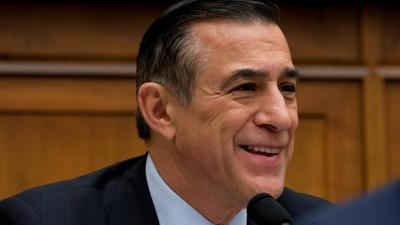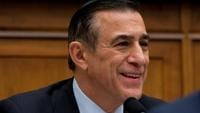
U.S. Rep. Darrell Issa, R-Escondido
In coming months, the U.S. Supreme Court will take up an Illinois congressman's claims that lower courts were wrong to box him out from suing the state over its mail-in balloting regime, which requires all mail-in ballots to be counted if they are received up to two weeks after Election Day, with or without a postmark proving they were mailed on time.
While the case involves a challenge to Illinois law, the outcome could have far-reaching implications, including in California, where prominent Golden State Republican U.S. Rep. Darrel Issa has launched a similar challenge to his state's controversial mail-in voting system and may face a similar attempt to quickly pull the plug on his legal challenge.
On June 2, the U.S. Supreme Court agreed to take up the case launched by U.S. Rep. Mike Bost, R-Illinois, and other Illinois Republicans, as they seek a court order declaring Illinois' vote-by-mail system illegal.
Bost represents Illinois' 12th congressional district, a heavily Republican district in southern Illinois.
He filed suit in federal court in Chicago in 2022, weeks before that year's November general election, seeking a court order that would specifically prevent Illinois election authorities from counting ballots delivered by the U.S. Postal Service up to 14 days after Election Day.
While the Illinois law requires all mail-in ballots to be mailed by Election Day, Illinois requires the votes received after Election Day to be counted even if they included no postmark or other independent proof they were mailed on time.
In the lawsuit, Bost and two other Illinois Republicans, who were seeking votes as presidential electors at the time, asserted the Illinois law violated both the constitutional rights of voters and candidates and ran afoul of a federal law establishing an official Election Day in early November.
Bost and his co-plaintiffs asserted Illinois violated that law by counting ballots which contained votes for U.S. House of Representatives, Senate or President long after Election Day.
Illinois established that system in 2020, when that state's Democratic legislative supermajority and Democrat Gov. JB Pritzker used the Covid pandemic to justify overhauling the state's election laws to greatly expand mail-in voting.
Critics of the law have asserted the new mail-in voting system creates new opportunities for dominant parties and powerful campaign organizations to manipulate the system or otherwise cheat by counting questionable or illegitimate ballots.
Bost and his co-plaintiffs have asserted Illinois' balloting system could allow potentially hundreds of thousands of otherwise invalid votes to sway close election contests.
llinois state election officials, with the support of the Illinois Democratic Party and the past support of the U.S. Justice Department, under the administration of Democratic former President Joe Biden, moved to dismiss the lawsuit. They argued Illinois law doesn't conflict with federal law because the Illinois law still requires all ballots to be mailed on or before Election Day, even if the law allows votes to be counted without any independent proof they actually were mailed at all.
Illinois Democrats have noted in court filings that striking down the law would make it more difficult for Democrats to win elections, as Democrats disproportionately vote by mail, compared to Republicans and other voters.
A federal judge, who was appointed by President Donald Trump during his first term, ruled against Bost and agreed to dismiss the lawsuit.
Bost also lost on appeal to the U.S. Seventh Circuit Court of Appeals. There a panel of three judges split 2-1 on the question of whether Bost had standing to sue. The majority included an appointee of Biden and a Trump appointee. The dissent came from a Trump-appointed judge.
In that ruling, the majority said Bost's claims that the law improperly forced him and his campaign to spend significantly more time and money to monitor vote counting were not enough to prove they were harmed.
Bost appealed to the U.S. Supreme Court last November. His attorneys with the conservative activist organization, Judicial Watch, urged the court to address the question, asserting the Seventh Circuit's reasoning ran counter to longstanding precedent that candidates had standing to challenge such voting rules.
"Indeed, 'it’s hard to imagine anyone who has a more particularized injury than the candidate has.' … That is because a candidate who 'pours money and sweat into a campaign, who spends time away from her job and family to traverse the campaign trail, and who puts her name on a ballot has an undeniably different - and more particularized - interest in the lawfulness of the election' than 'some random voter,'" they wrote.
In the meantime, while Bost advanced his claims before the Supreme Court, Judicial Watch joined with Rep. Issa in California to similarly challenge California's mail-in balloting rules.
Issa and Judicial Watch filed suit in San Diego federal court in March, asserting California's law allowing mail-in ballots to be received up to a week after Election Day also violated the federal Election Day law.
“Federal law requires an Election Day – not an ‘Election Week,’” Judicial Watch President Tom Fitton said at the time the lawsuit was filed. “California’s counting of ballots that arrive a full seven days after Election Day is unlawful, encourages fraud, and undermines voter confidence in election outcomes.”
In his lawsuit, Issa notes the extended ballot receipt deadlines in California and elsewhere have almost entirely favored Democratic candidates, who benefit in election after election from lopsided vote-by-mail counts in their favor.
Routinely, the lawsuit noted, Republican candidates surge to a lead on Election Day, only to watch their leads get whittled away day by day, as more and more purported Democratic votes arrive, until Democratic candidates squeak out a win in the final days of vote counting in California and elsewhere.
In California, however, the process can be particularly excruciating, as the state routinely takes more than a month to count ballots in a wide assortment of races, including for Congress.
Issa noted two of his Republican colleagues, former U.S. Reps. Michelle Eunjoo Steel and John S. Duarte, both lost their seats in the 2024 general election in that fashion, surging to leads only to lose "due to late-arriving VBM" (vote-by-mail) ballots, which broke heavily for their Democratic opponents as election officials claimed to continue counting votes for weeks after Election Day.
In the lawsuit, Issa claims the law and extended vote counting violate his constitutional right - and those of other candidates - to run for office under the rules laid out in federal law.
He asserted the extended vote-by-mail deadlines cause him and other candidates to budget "the campaign's limited resources" and spend money to "organize and monitor late-arriving VBM ballots," when the votes shouldn't even be counted, under federal law.
Under California election law, Issa said, "more votes will be counted than federal law allows to be counted."
The state has not yet responded to the lawsuit in court.
However, a collection of activist groups, including the League of Women Voters, Vet Voice Foundation and the California Alliance for Retired Americans, have intervened in the case, in opposition to Issa's lawsuits.
They claim allowing Issa to win would result in legal votes not being counted and voters being disenfranchised. They noted more than 80% of voters in California cast ballots by mail.
To this point, no one has filed a motion to dismiss the lawsuit. In an order issued June 2, U.S. District Judge Andrew G. Schopler called for such a motion to be filed on June 11. Schopler directed all replies to that motion to be filed by July 28, and all replies to those responses to be filed by Aug. 27.
In an order posted on May 16, Schopler indicated that "any motion to dismiss in this case must address the standing and ripeness issues" which were discussed in court at a hearing that same date.
Likely, those "standing and ripeness issues" would be similar to those that led to the Illinois judges to reject Bost's lawsuit against that state's vote-by-mail law.
However, those questions are likely to be addressed by the U.S. Supreme Court in coming months. The court has not yet scheduled oral arguments in the Illinois case, but such arguments are likely to be held sometime in the period of October 2025 to April 2026.
In response to the Supreme Court's agreement to hear Bost's case, Fitton said: “It is an injustice that the courts would deny a federal candidate the ability to challenge an election provision that could lead to illegal votes being cast and counted for two weeks after Election Day.
“The Supreme Court’s decision to hear this case is a critical opportunity to uphold federal law, protect voter rights, and ensure election integrity."


